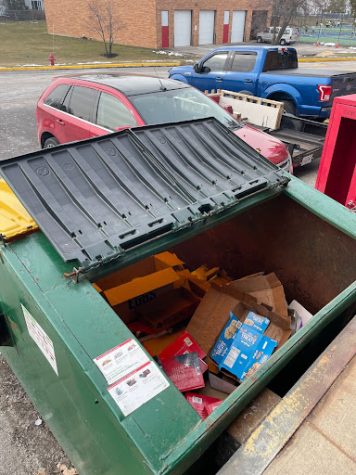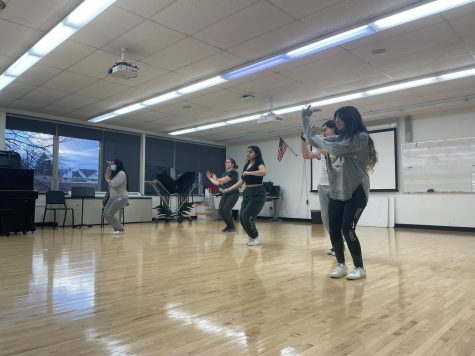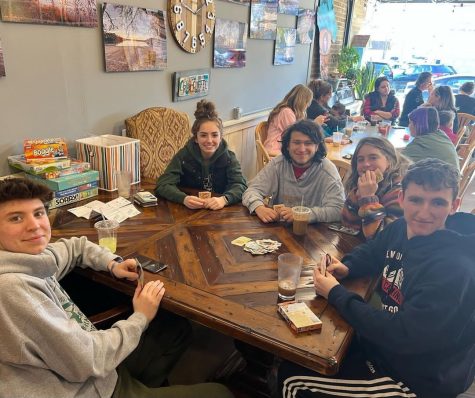College Scramble
December 17, 2015
Senior year brings on a new level of stress for students who are looking to continue their education beyond high school. Finding a college that is a perfect match can be a daunting task. However, MHS provides multiple tools for students to aid them in the process, but here are some additional tips for the college research process.
“I use Naviance a lot,” said Senior George Kostantinidis. “I started looking for colleges I’d say in late June or early July when I was out in Colorado. I was doing my first college visit, and ever since then I’ve been more interested in it.”
But one tip many students don’t know is that college searching can start during freshman year.
According to Guidance Counselor Andrea Rusk, starting research during freshman year will ensure students are more prepared and know where they want to apply as seniors. This will make the college process seem like a less daunting task.
“A student that comes in having an idea of what they want to do, thinking about their career their freshman and sophomore year, spending time junior year going on college visits, stopping down at the CCRC [College and Career Resource Center], meeting with representatives, doing some research online, using the tools on Naviance, finding out which programs are the best fit for them, those students, when they come in as a senior and they’re ready to start those college applications, they already have an idea of what schools they’ll be applying to,” said Rusk.
Thinking about one’s career goals and future plans when looking at colleges will help eliminate some options if those universities don’t have the desired major.
For Senior Hunter Ashton finding a college with his desired major has been a challenge because his intended major is Aerospace.
“It’s not very common,” he said, “so there’s only a select number of schools that have that major, so it’s difficult to find them.”
However, he has been able to apply to 10 schools with this major in mind.
Another tip is that students should have a list of questions to ask themselves and their guide when visiting a college to ensure it’s going to be a perfect fit.
“The very first question should be ‘how do you feel on that campus?’ because you have to imagine yourself being there and living there for four years. If you feel uncomfortable, or it’s not going to be home to you, you are unlikely to be successful even occasionally when the program is the best fit,” said Rusk.
Rusk also encourages students to think about what resources they will need at the college.
“What do you use [at MHS], and do they have those there? If there are specific resources you use at the high school level, ask on college visits what they have to assist you with,” she said.
Students also need to consider the distance from home.
“Do you need to be close to your parents, or maybe you want to be farther away from your parents. The expense of travel is a good question, too, because people mostly think about the cost of tuition and other costs that go into college, but you also have to consider how you’re going to get there and home,” said Rusk.
All of these questions take organization, which is a key to a successful college search.
“Being on top of what your applications require, knowing all of the pieces that you have to do so that you don’t have the deadlines hit all of the sudden” are important, according to Rusk.
She added that students must plan out their time to ensure all the pieces of an application are done in an organized fashion. This includes coordinating schedules with teachers on letters of recommendations.
“Check in with your teachers at least two weeks in advance for letters of recommendation; all of those pieces will be easier with organization,” she said.
After everything is submitted, the work toward getting to college should not stop there.
“Students’ final transcripts are sent to their college at the end of the year, so students tend to think because they’ve been accepted, they can take the rest of the year easy,” said Rusk. “However, schools do still have the option to rescind their offer. It doesn’t happen often, but if students decide to go down a steep hill, their acceptance can be pulled. Senioritis can be detrimental if [students] really go downhill.”
Top 5 Resources for Students at MHS
- School counselor: They can help students choose majors, colleges and high school schedules that align with the student’s future goals.
- Naviance: It can filter through and search for colleges, tell students deadlines, link students to the college’s website, find applications, link teachers to student accounts for letters of recommendation and provide a checklist of where the student is in the application process.
- The College and Career Resource Center (CCRC): Students can meet with representatives from colleges and get more information as well as study material for the ACT or SAT.
- Literacy Center: Those in the Literacy Center can offer help on personal statement and essay writing through individual appointments that can be set up during and outside of school hours.
- ISAC [Illinois Student Assistance Commission]: A representative comes to the school to help students learn more about financial resources, such as scholarships and FAFSA.

![MHS Alum Trey Baker hosting a MBK rising event on February ninth at the MHS annex. Said Baker, “I’m just really excited [and] super grateful for the community of Mundelein, for our educators, for our administration, at MHS who are really buying into this.”](https://mhsmustang.com/wp-content/uploads/2023/03/TreyBaker-350x475.jpg)

